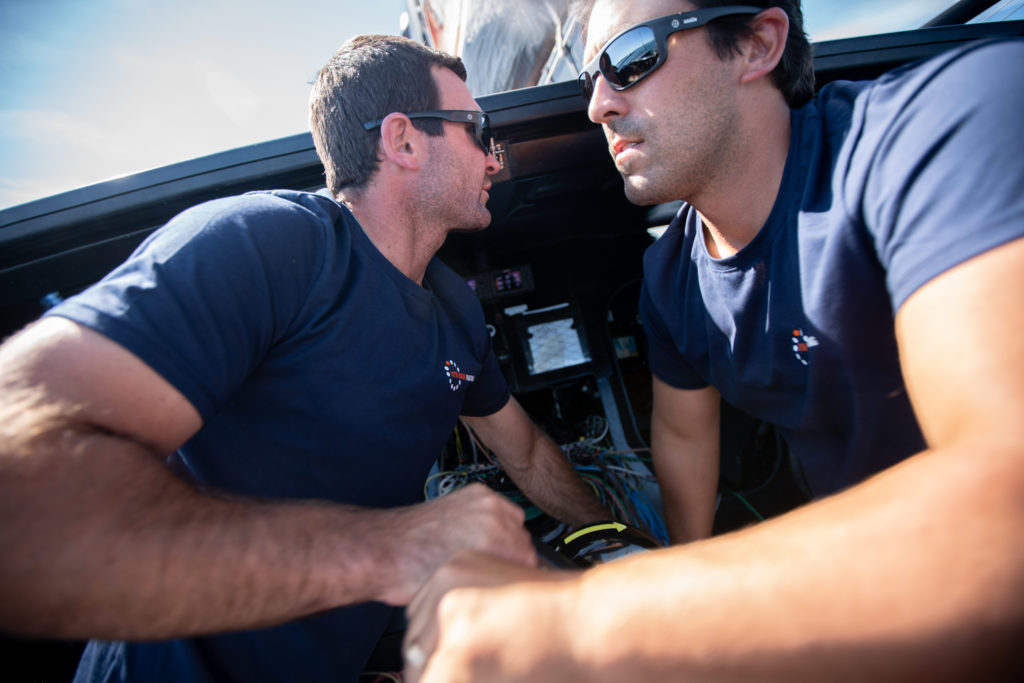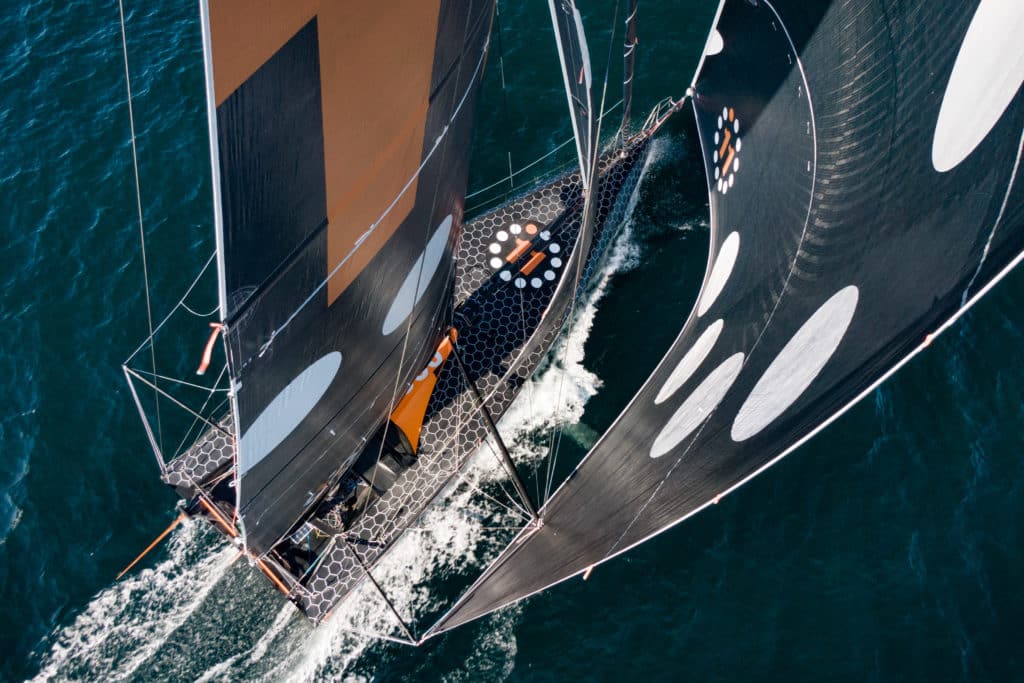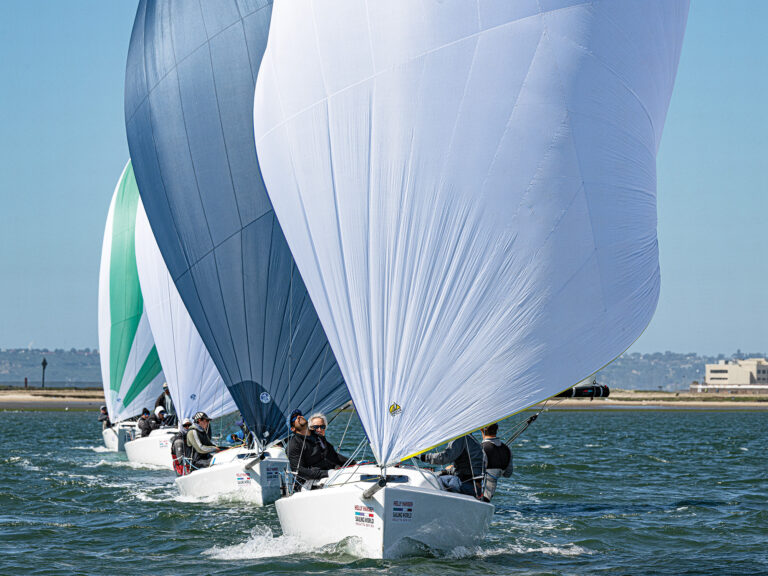
On an early September morning at the Newport Shipyard in Rhode Island, Charlie Enright is on the hunt for a pair of sailing shoes. Boat call is 1100, and while he’s capable of going barefoot, this particular day sail is with his boss, Wendy Schmidt, co-founder of 11th Hour Racing, title sponsor of the eponymous Ocean Race team.
In the department of dress to impress, it’s best not to show up for work without kicks. Enright—today at least—may be a cobbler’s kid without shoes, but he can be forgiven, for he has more pressing concerns as the co-skipper of a new (to him) IMOCA 60. He’s staring down a long, dark tunnel to the start of The Ocean Race in the autumn of 2021. The proverbial light is hardly visible, but three years out, he says, he has everything a young two-time round-the-world skipper could want: time and money.
“It’s no secret that in the first campaign [with Alvimedica] we didn’t know what we were doing,” Enright says. “We learned a ton from it and felt like we were in a good place in the last go around [with Vestas 11th Hour Racing]. Situations out of our control didn’t allow us to realize our goals, so it’s exciting to be in early, in a development class with a real leg up.”
The next edition of The Ocean Race will feature two different classes: foil-assisted IMOCA 60s and recycled Volvo 65s. Enright and Towill have chosen the IMOCA for obvious reasons: it’s faster, far more advanced, and demands half the crew of the 65. “The 65 allowed us to do what we’ve done,” Enright says. “We’re a product of it, but it’s a good time for us to take a big step forward.”
For their third attempt to win what was formerly the Volvo Ocean Race, Enright and his equal, Mark Towill, secured the early backing of 11th Hour Racing, allowing them to purchase the earlier-generation IMOCA 60 Hugo Boss from Alex Thompson in April. Their relationship with the organization goes back a decade when they raced across the Atlantic in 2011. “They supplied us with organic freeze-dried food,” says Enright with a chuckle. “It’s been an evolution from then on.”
After winning this summer’s Rolex Transatlantic Race onboard David and Peter Askew’s Wizard, Enright spent the entirety of the summer in France, acclimating to the IMOCA culture and apprenticing alongside Volvo Ocean Race-winning navigator and shorthanded racing legend, Pascal Bidégorry. “The only way to learn is by learning,” he says. “So I jumped into the deep end.”
More accustomed to calling the shots from the helm or the nav station, Enright has had full immersion in the art of doing things himself. “It’s been eye-opening for sure, the shorthanded bit,” he says. “It’s like being the bowman, the boat captain, the navigator, the medic and everything else.”
He now has a greater appreciation for the French sailing culture and says it’s no coincidence that Franco-led teams have dominated the last two editions of the round-the-world race: Frank Cammas-led Groupama and Charles Caudrelier’s Dongfeng. “They can talk to you about sails, how to rewire the boat, the navigation, whatever it is,” he says. “The days of the specialists are kind of over. They are well rounded sailors and you have to be for shorthanded racing. It’s been a lot of learning for me, but I’m having fun with it. It’s all new.”
What will also be new for Enright and 11th Hour Racing, eventually, is an IMOCA 60 for the next edition of the race. The team has retained the design services of Guillaume Verdier as well as the support of MerConcept, the French project management company founded by Vendée Globe winner and round-the-world record holder Francois Gabart. MerConcept’s army of experienced technicians and engineers, which oversee Gabart’s Ultime 100 projects, will certainly help propel the development of 11th Hour Racing’s 60-foot weapon.
“They just built a 60 [Apivia for Frenchman Charlie Dalin] and we’ll be piggy back off that in some ways,” Enright says. “It’s sort of like having a three-boat campaign; the boat they just launched, the boat we’re sailing on, and the one we’ll build. Having the relationship with them has certainly helped so far. Gabart is royalty over there. He’s an amazing, humble and hard-working guy.”

However, while Dalin’s Apivia is designed exclusively for the solo Vendée Globe in 2020, the steed of 11th Hour Racing must be designed and built around a crew of five, which Enright says invites a long list of considerations. “No one has ever done what we’re about to do,” he says of a fully-crewed IMOCA 60. “With the configurations, the deck layouts and what have you, what may work on the Vendee won’t work for the Ocean Race. In the development world you can win or lose the race before it starts. It doesn’t matter who’s sailing the boat.”
What could ultimately be different between the two breeds of IMOCA 60s is complicated, says Enright, followed by a long and calculated pause. For one, there will be more helming and less full-time reliance on the autopilot. There are the side foils, of course, and their infinite range adjustments, the sail inventory, the stacking of those sails, as well as the mechanics of getting them up and down with only five crew, likely divided into doublehanded watches. Then, there’s where everyone is going to fit, sleep, store food, spares and media equipment. The racecourse itself presents a different menu of design variables, too.
“The Vendée is basically a race to Cape Horn and back to Brest,” Enright says. The complete Ocean Race course, yet to be announced, is a much different beast with various ports of call and complex inshore segments.
Enright’s crash course in shorthanded sailing is ongoing and will continue this fall with a go at the doublehanded Transat Jaques Vabres, from France to Brazil, alongside Bidegorry. Enright says he’s good at looking at the routing and the weather and knowing what the next sail will be, but admits he’s gotten used to having a top-shelf crew to do the heavy lifting. “I’d be like, ‘OK guys, I think we should reef!’ And It would happen. Now I have to do it myself. And the autopilot…it feels weird to set it to a heading or true-wind-angle and then go to sleep at 30 knots. To have faith in it is crazy. I haven’t got used to that part yet.”
While the father of two young children gets his doublehanded miles in the Atlantic over the next few months, Towill, newlywed and living in Hawaii, will oversee the team’s budgetary work, its relationships with commercial partners and sponsorship liaison before joining Enright a full team for a post-race training run from Brazil to a destination unknown. “He’s instrumental,” says Enright. “There’s so much more to these campaigns than the sailing. It’s arguably harder to get to the start than the lap itself and he’s incredibly smart with all that. We divide and conquer and we’re efficient that way.”
For 11th Hour Racing’s part, this latest sponsorship is also a significant step in activating its platform on a more global scale. The intent is to fund grassroots sustainability projects wherever the race fleet pulls into port, says 11th Hour Racing president Rob MacMillan. As a partner of the race itself, they’re also launching several high-level ocean health summits at a few stopovers.
“We expect them to win the race,” MacMillan says. “Winning is the objective, but the team is really a billboard for what we’re doing with the race. Our short-term objective is to focus on the French market, which is super engaged in the sport and ocean health issues close to them. We’re going to use that to talk about how ocean health is the driver for climate change and invest in the non-profits there. Then we will engage on local issues everywhere we go. We’re committed beyond this campaign, to establishing a legacy, not talking about it, but getting our hands dirty around the world.”
In the meantime, there’s much work to be done. Starting with finding Enright a pair of sailing shoes. The boss is ready to go sailing.









